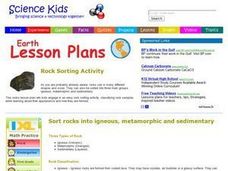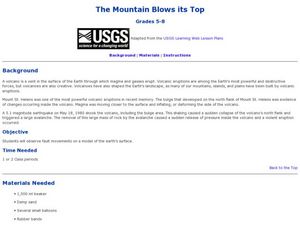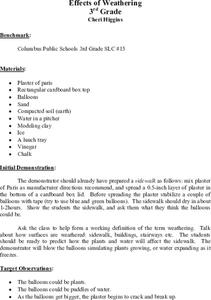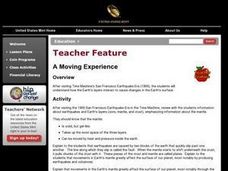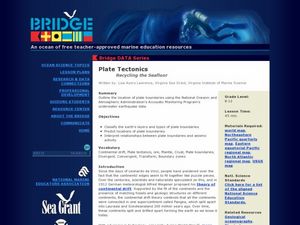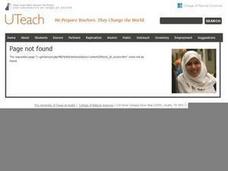Curated OER
Sun Activity
In this space science worksheet, middle schoolers find the answers to the questions concerning the topic of the sun and they label the diagram for the sun.
Curated OER
Rock Sorting Activity
Students organize rock samples according to their properties. In this earth science lesson plan, students predict whether they are igneous, metamorphic or sedimentary. They compare their prediction with the actual type.
Curated OER
Earth's Valuable Soil
Students investigate the concept of how the earth is segmented into different parts. They use an apple as a model to display the different layers. The apple is divided into different fractions by being cut into different size pieces.
Curated OER
The Grand Canyon
Fourth graders study the Grand Canyon. They research the Grand Canyon and locate the Colorado River on the map of Arizona. They discuss erosion and read how sedimentary rock was formed. They view photographs of the Grand Canyon and...
Curated OER
The Mountain Blows its Top
Students replicate a volcanic eruption. In this volcanoes lesson, students follow the provided procedures to show and describe how the inflation of a bulge led to the eruption of Mount St. Helens.
Curated OER
King of the Mound
Students investigate water as an agent of change. They conduct an experiment involving a mound of soil, observe and record any changes that occur when ice melts on the mound of dirt, and create a drawing of the changes that take place...
Curated OER
The Science of Glaciers
Learners identify the contents of a glacier like those found in Patagonia. They construct a mini glacier model in class. Students compare and contrast the classroom model with Patagonian glaciers. They label specific parts of the...
Curated OER
A Model of the Sea-floor
Young scholars create a paper model to illustrate sea-floor spreading.
Science 4 Inquiry
Edible Plate Tectonics
Many people think they can't observe plate tectonics, but thanks to GPS, we know that Australia moves at a rate of 2.7 inches per year, North America at 1 inches per year, and the Pacific plate at more than 3 inches per year! Scholars...
Curated OER
Science: Trouble in the Troposphere
Learners research a NASA Website and record information about an assigned city's tropospheric ozone residual monthly climate. In groups, they graph the information for the past year. They form new groups and compare their city's...
Curated OER
Environment: Battling for Oxygen
Students construct an interactive ozone depletion model using gumdrops and toothpicks. After analyzing the data obtained from the model, they record it on butcher paper and complete worksheets about oxygen.
Curated OER
Fossil Fuels (III), The Geology of Coal: Interpreting Geologic History
Students hypothesize about why various samples of coal have different characteristics. Pupils use information that they found during Internet searches to ascertain the validity of their hypotheses and verify the "story" of coal. ...
Curated OER
Types And Magnitudes Of Earthquakes
Learners investigate the concept of earthquakes and the different types of magnitudes. They research the Richter scale and how it is used to measure the intensities of earthquakes. Students then apply the concept by completing a...
Curated OER
The Spectrum of a Star
Tenth graders identify stars based on their line spectra. In this astronomy lesson, 10th graders analyze spectrograph and determine the elements present in the star. They explain the relationship between temperature and star classes.
Curated OER
Comparison Activities
Students explore the size of the sun and it's temperature. Using the Internet, students visit given websites to compare the sun's diameter, outer layers, and mass to visual items students can relate to. They also compare the sun's...
Curated OER
Wave Math
Students identify the different factors affecting the size and shape of ocean waves. In this math lesson, students calculate wave speed and wavelength given a mathematical formula.
Curated OER
Effects of Weathering
Here's a great geology lesson for 3rd graders on weathering and erosion of soil. After a class discussion on how nature can "move a mountain," learners take a look at how a modern phenoma called acid rain can also cause weathering and...
Science Matters
Slip Sliding Along
The San Andreas Fault is the largest earthquake-producing fault in California. In the seventh lesson in the 20 part series, pupils create maps of California, focusing on the San Andreas Fault system. The comparison of where...
Curated OER
A Moving Experience
Students visit Time Machine's San Francisco Earthquake Era. They understand how the Earth's layers interact to cause changes in the Earth's surface. They review information about earthquakes and Earth's layers.
Curated OER
Plate Tectonics: Recycling the Seafloor
Learners classify earth's layers and plates using Ocean Seismicity data. In this plate tectonics lesson plan, students outline where the plate boundaries are on the world map. They then compare these predicted boundaries with USGS map of...
Curated OER
A Model of Three Faults
Pupils investigate faults. In this science instructional activity, students explore the many stresses and strains in the earth's layers and research the types of faults in their state.
Curated OER
Biomes: Extreme Climate
Pupils discuss the causes of global warming. In this earth science lesson, students examine how global warming is connected to the arctic and world climate. They write a paragraph about their interconnection.
Curated OER
Effects of Ozone in the Air
Fifth graders, in groups, conduct an experiment in which they measure ground level ozone levels using an ozone measuring kit. They analyze and compare the weather conditions and locations where ozone readings are highest and lowest.
Curated OER
Greenhouse Effect: Pop Bottle Experiment
Young scholars explore global warming by conducting a weather experiment. In this greenhouse gas lesson, students define the greenhouse effect and the impact on our ozone layer. Young scholars utilize a soda pop bottle, floodlight bulb,...



